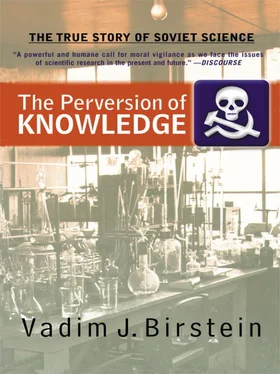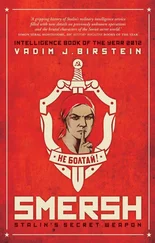Vyshinsky: What for?
Bulanov: It was always emphasized that it must be under the control of Yagoda, as he had in his arsenal a sufficient number of poisons as means for definite ends.
Vyshinsky: What ends?
Bulanov: For counterrevolutionary ends, for purposes of assassination. I know that he employed a number of people on this work. The setting up of this laboratory was an actual fact… Yagoda warned me that this matter was so important that the people mentioned must be allowed unlimited funds and that no accounts were to be demanded. 42
Of course, this was a show trial and the accused persons had no other choice than to follow the scenario prepared under the guidance of Vyshinsky, approved by Stalin and, evidently, the Politburo. But it is interesting that Bulanov’s answers included real details of the secret laboratory’s work, its direct subordination to the state security commissar, and its clandestine nature.
Yagoda’s alleged plan to assassinate Yezhov was quite unrealistic, but it was designed to impress the show trial’s audience. Bulanov testified:
When he [Yagoda] was removed from his post as People’s Commissar of Internal Affairs, he directly set about laying poison in the office and those rooms which adjoined the office in the building of the People’s Commissariat of Internal Affairs which Nikolai Ivanovich Yezhov was to occupy. He instructed me personally to prepare a poison, namely, to take mercury and to dissolve it in acid…. I recall that he cautioned me against sulfuric acid, against burns, odor and more of the same kind… I carried out these instructions of Yagoda and made the solution. The spraying of the office which Yezhov was to occupy and the adjoining rooms, the rugs, carpets and curtains was done by [an NKVD officer] Savolainen in the presence of Yagoda and myself. This was on September 29 [1936]. Yagoda told me that this spraying must be done five, six, or seven times, which was done. Two or three times I prepared large flasks of this solution and gave them to Savolainen. He did the spraying with a spray. I recall that it was a large metallic cylinder with a large bulb… It was kept in Yagoda’s dressing room; it was a foreign-made spray… 43
Many victims from Bukharin’s show trial were later rehabilitated. According to Russian law, a special procedure can “rehabilitate” a person condemned to imprisonment or to death for political crimes under the dreaded Article 58 of Stalin’s Criminal Code. At present, usually close relatives of the former political prisoner submit a request to the General Prosecutor’s Office to initiate the process of rehabilitation. In 1988, the Russian General Prosecutor’s Office, during the rehabilitation process of victims of the Bukharin trial, issued an official statement regarding this incident:
The terrorist act against N. I. Yezhov (mercury poisoning) was falsified by Yezhov himself and a former Head of the NKVD Counterintelligence Department, [Nikolai] Nikolaev… Nikolaev consulted with the Head of the RKKA [Red Army] Chemical Academy Anovitsky on methods of mercury poisoning. After this he rubbed mercury into the upholstery of the furniture at Yezhov’s office and then provided [a sample of it] for analysis. NKVD officer Savolainen, who had had access to Yezhov’s office, “confessed” after systematic beatings [during interrogations] to preparing the poisoning of Yezhov by mercury. After Savolainen’s arrest a jar with mercury was placed secretly in the hallway of the building where he lived. This jar was “discovered” later and was filed as material evidence in the case. 44
This story sheds some light on how the NKVD/MGB provided “evidence” for show trials. But, as I will describe below, the spraying of toxic chemicals was in fact used by the NKVD/MGB/KGB for assassinations.
During the trial, three doctors were accused of carrying out Yagoda’s orders and killing prominent writers and party leaders: the prominent cardiologist Dr. Dmitrii Pletnev (professor of the Institute of Functional Diagnostics), Dr. Lev Levin (a consultant at the Kremlin Hospital), and Ignatii Kazakov (director of the Scientific Research Institute of Metabolism and Endocrinology). 45Two more doctors were also arrested in connection with the Bukharin case: A. I. Vinogradov of the NKVD medical section, and the head of the Kremlin Hospital, Khodorovsky. During the trial, Dr. Vinogradov was accused (together with Dr. Levin) of giving the wrong medical treatment to Gorky’s son, Maxim, on the order of Yagoda. 46However, both Vinogradov and Khodorovsky “mysteriously” died during the investigation before the trial. 47
This was the second trial of Professor Pletnev. An NKVD provocation preceded Professor Pletnev’s arrest. On June 8, 1937, the main USSR daily Pravda published an unsigned article entitled “Professor—Rapist, Sadist.” It described that three years earlier while examining a woman called “B.” in the article, Pletnev supposedly bit her on the breast. As a result, B. developed chronic mastitis and became disabled. The article caused a flow of angry letters, including some from medical colleagues such as Vladimir Zelenin, Boris Kogan, Yefim Gelstein, and Miron Vovsi. 48The behavior of Vladimir Vinogradov was even more disgusting. One of Pletnev’s best pupils, he agreed to act as an expert witness and confirm the indictment against Pletnev, during the latter’s investigation. 49After Pletnev’s arrest, Vinogradov became Stalin’s personal physician. The expert commission consisted of prominent professors: D. Burmin (known as a professional rival of Pletnev), N. Shereshevsky, V. Vinogradov, D. Rossiisky, and V. Zipalov. 50Later, in 1952–1953, Zelenin, Kogan, Gelstein, Vovsi, Vinogradov, and Shereshevsky became victims of the “Doctors’ Plot,” and a new commission consisting of doctor-experts confirmed their alleged “criminal intentions” to kill Soviet leaders.
At first Pletnev was tried in a closed session of the Moscow City Court because he refused to plead guilty. On July 18, 1937, the court pronounced a two-year suspended sentence. 51However, this was not enough for General Prosecutor Vyshinsky, who personally disliked the famous and independent doctor. Their conflict had started in 1925, when Vyshinsky was appointed rector of Moscow University. Vyshinsky immediately fired old professors on the basis of their “bourgeois origin,” and Pletnev opposed these actions in his clinic. 52On March 12, 1938, Vyshinsky accused Pletnev in an article in Pravda : “The history and the chronicle of the criminal killings tell us that during the last decades poisonings by professional killers almost disappeared. These poisoners were replaced by doctors.” However, as I have described in the previous chapter, the reason for the arrest of Drs. Pletnev and Levin in connection with Bukharin’s trial might have been deeper: In 1932 they refused to sign a false death certificate for Nadezhda Allilueva, Stalin’s second wife.
The subject of poisons played a poignant role in the Bukharin trial. Bukharin agreed to participate in the show trial on the condition that he be given poison after the trial. He wrote to Stalin: “…Let me urge you by all that is dear to you to let me, instead of being shot, take poison in my cell (give me morphine, so I can go to sleep and never wake up again). Take pity on me, let me spend my last minutes in my own way…” 53He repeated the same request in a letter to the investigator Lazar Kogan 54during the trial: “Remember about the c-u-p. You promised it to me and I hope that you will NOT cheat me… I believe that you will fulfill my request. I ask you not to profoundly distress and disappoint me…” 55
The figure of Nikolai Bukharin has always intrigued me. He was an extremely educated person. He wrote serious studies on economy and philosophy and on the history of culture. He was a good writer and did excellent, practically professional drawings and paintings. According to the memoirs of Bukharin’s widow Anna Larina, in 1935–1936, three of his paintings were exhibited at the most famous and prestigious museum of Russian art, the Tretyakov Gallery in Moscow. 56 He was also a good naturalist. My father told me that when he was a boy, from time to time my grandparents took him and my uncle to a country house (a “dacha” in Russian) in the suburbs of Moscow that belonged to the Commission for Improving the Living Conditions of Scientists, the TseKUBU. My grandfather Avadii Birstein was a rather famous Moscow doctor. He graduated from the Medical Department of Moscow University in 1890, which was quite an accomplishment since according to laws of the Russian Empire, Jews could apply only to the medical and juridical departments of universities and amount to about 6 percent of all students at these departments. In 1914, my grandfather, at the time the author of several original surgical methods, was invited to the newly opened Institute of Traumatology in Moscow. There, he was elected chief surgeon by the staff of doctors. After the revolution, my grandfather received help from the TseKUBU, in recognition of his service.
Читать дальше











